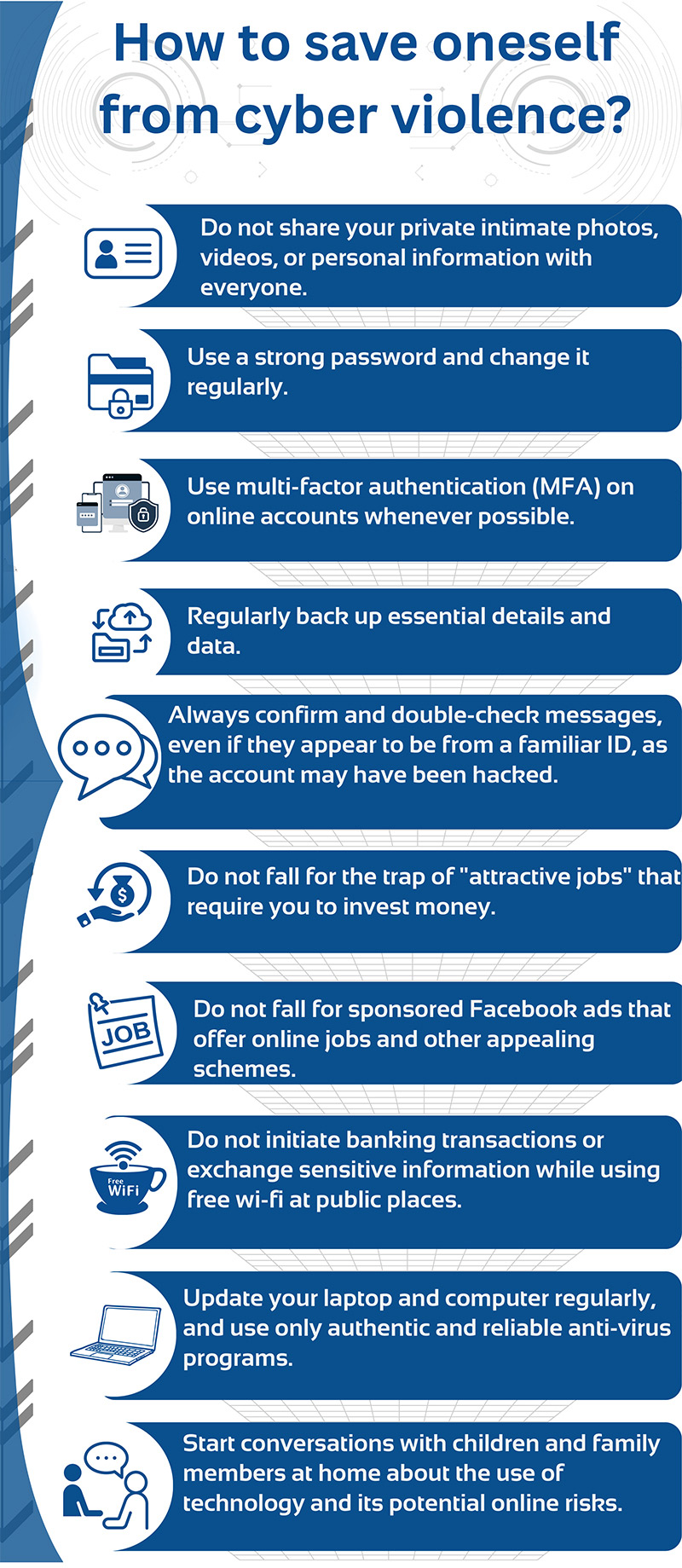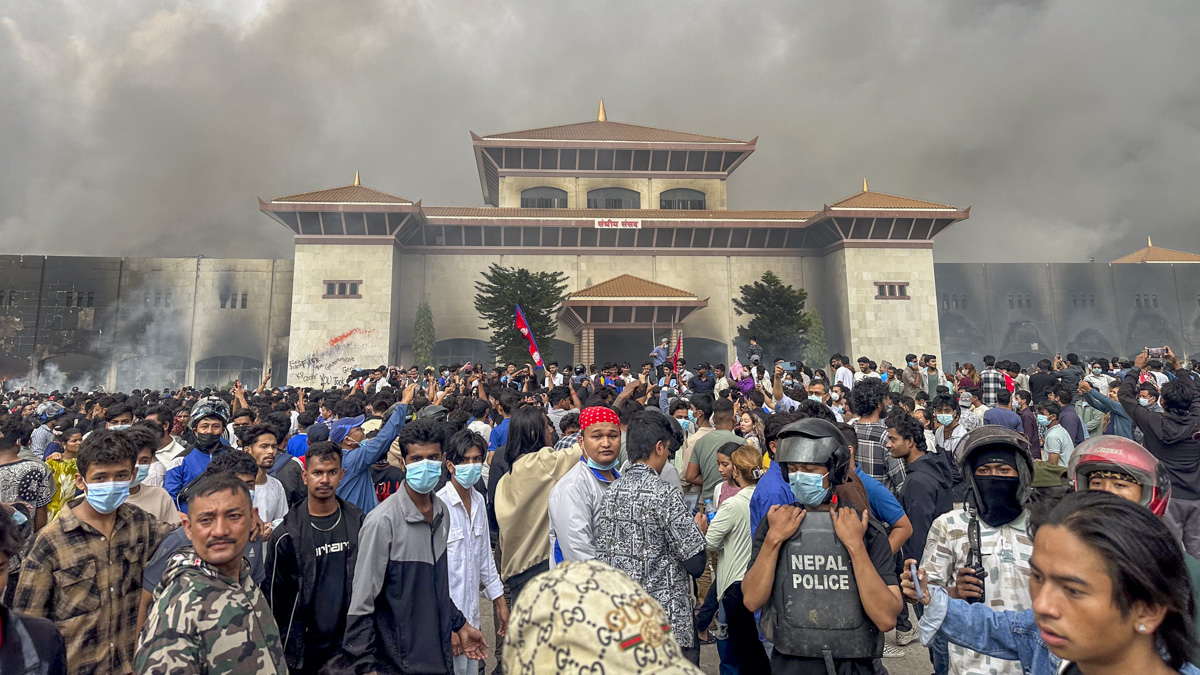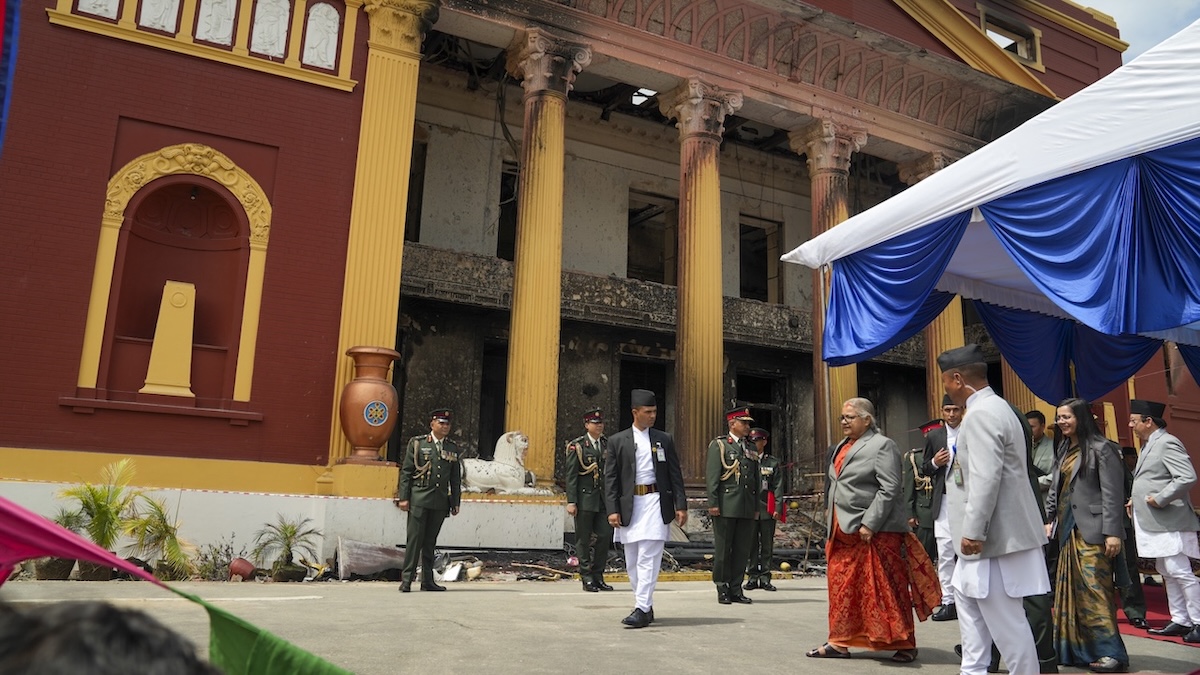Read this story in Nepali: ‘सेक्सटोर्सन’ मा पर्दै किशोरी, अस्पष्ट कानुनले पीडकलाई उन्मुक्ति
--- ---
Incidents of criminals entrapping women and girls in sextortion schemes in the name of love are on the rise. Due to weak laws, perpetrators often get away with their crimes, while victims are further traumatized.
 Before delving into the details, here are some key terms used in the story:
Before delving into the details, here are some key terms used in the story:
Online bullying: When a person is shamed or mocked about their personal private matters in an online space.
Sexting: The act of sending sexually explicit messages.
Sextortion: The act of threatening, blackmailing, or criminally exploiting a person by threatening to expose sexually explicit private images.
--- ---
Karuna (name changed) from Kathmandu received a nude photo of herself on Instagram from Abhinash Pradhan, 26, who is seven years her senior. The message read: "If you don't do as I say, this photo will be on your brother's Facebook tomorrow."
Abhinash was the same person Karuna had been in a relationship with until a year ago. She had broken up with him after their relationship soured.
Unable to cope with the breakup, Abhinash began creating AI-generated nude photos of Karuna and sending them to her. He didn't just send the photos; he also began blackmailing and harassing her with them. "I did all this out of anger; I did these things because I was hurt when Karuna dumped me," Abhinash said in his police statement. "I have not sent Karuna's nude photos to anyone, nor have I posted them anywhere." After Abhinash began blackmailing and harassing her with the photos, Karuna filed a complaint, leading to his arrest on December 18, 2024.
The case against Abhinash is pending in the Kathmandu District Court, which, on April 7, 2025, ordered the production of the test report.
Like Karuna, Tapasya (name changed) from Ramechhap is a victim of blackmail and harassment from her former lover. She was in a relationship with Shree Krishna Karki, 19, who was her age. Their relationship, which began in school, soured after a dispute, and they broke up. Since January 2025, Shree Krishna has repeatedly threatened Tapasya, saying he would send photos taken during their intimate relationship to her relatives.
"He would threaten to send my photos to my family if I refused to meet him," Tapasya said in her police statement. "After I ignored him and blocked him, he not only sent all the photos to my family members but also made them public on Facebook using a fake ID." The case against Krishna is also pending in the Kathmandu District Court.
Like Karuna and Tapasya, 1,200 teenage girls have approached the Nepal Police Cyber Bureau in the last year after being victimized by those who threaten, blackmail or seek criminal benefits by threatening to make intimate or pornographic images public. The number of such victims is growing.
"Sexual violence that occurs offline has shifted to the online space with the development of technology," says Deepak Raj Awasthi, Superintendent of Police (SP) and spokesperson at the Cyber Bureau. "Such incidents have been increasing recently."
According to the Cyber Bureau, 929 complaints related to cyberbullying, sextortion, and sexting were registered in the Fiscal Year 2022/23; 1,396 in 2023/24; and 2,322 in 2024/25. The "Romance at Risk" research by Child Safe Net also showed that one in four teenagers or young people experience online abuse from their partners.
Marriages in peril
It's not just adolescents and young people who are victims of cyberbullying, sextortion and sexting. According to the Cyber Bureau's records, even married women are being caught in these traps. Sharmila, a 29-year-old mother of two from Nuwakot, is one such victim.
Sharmila met Amarnath Kumar, 20, an Indian citizen who worked in her village's workshop and she considered him a brother. However, their relationship went beyond that of siblings. Amar continued to talk to her regularly even after he returned to India. When Sharmila no longer wanted to talk or stay in touch with him, Amar began threatening her, according to her statement.
"He said that he had my nude photos," Sharmila said in her police statement. "He threatened to tell my husband if I did not show him my private parts on the video call." She added that he screen-recorded the conversation and sent the video to her husband and brother-in-law.
Since then, Sharmila's marriage has been in trouble. "He threatened me and put my marital life at risk," she said. "I have two children and I have to protect my relationship for them." The case against Amar is also pending in the Kathmandu District Court.
Toll on life
Sharmila, Tapasya and Karuna all reported their cases to the police and cases were filed against their perpetrators. Their fight for justice continues but not all victims report the crimes committed against them. "Not all victims speak out; many incidents are not recorded," says Anil Raghuvanshi, president and researcher at Child Safe Net. "Some victims keep the cases unreported, and some even commit suicide."
Lalita (name changed), a teenager from Dhading, committed suicide after her lover made their intimate pictures public after they broke up. In 2019, she met Rupesh (name not disclosed because he was a 16-year-old minor) when they were both in grade 11. Their friendship blossomed into a romantic relationship.
A year later, in the first week of April 2020, Rupesh asked Lalita for a nude photo. She trusted him and sent one on Facebook Messenger. He then forwarded it to his friend Anish Rimal. On May 28, 2020, Anish shared Lalita's photo in a Facebook Messenger group called 'Covid-19 Boka Group,' which had 20 to 21 members.
Anish created a fake Facebook ID named 'David Ryder' and began blackmailing Lalita with the photo. After receiving several messages and demeaning comments, Lalita committed suicide on June 24, 2020.
It has been five years since Lalita's suicide. The Dhading District Court declared both Rupesh and Anish guilty of abetment of suicide. However, Lalita's family says that justice was not served, as the culprits were given minimum sentences.
After Lalita's suicide, her family filed a suicide abetment case against Rupesh and Anish at the Dhading District Court on July 24, 2020. Similarly, another case was registered against Anish at the Kathmandu District Court on July 27, 2020, under the Electronic Transactions Act. The Kathmandu District Court also found Anish guilty in this case.
The Dhading District Court fined Anish Rs. 5,000 and sentenced him to six months in prison, while Rupesh was sentenced to four months in prison and fined Rs. 3,335. However, since Rupesh is a minor, the court ordered that he be handed over to his family under Section 36 of the Children's Act (2018). The court also ordered Rupesh's family to pay Rs. 25,000 in compensation to the victim's family.
Lalita's brother objects to the court imposing only minimum sentences on the culprits. "Even though both courts found them guilty, they weren't given the punishment prescribed by law," Lalita's brother said. "How is that even justice?"
Rajendra Adhikari, then judge of the Kathmandu District Court, convicted Anish under the Electronic Transactions Act and sentenced him to six months in prison along with a fine of Rs. 6,000. Section 47 of the Electronic Transactions Act (2008) provides for a maximum imprisonment of five years and a fine of up to Rs. 100,000.
Roshan Awasthi, an assistant attorney at the District Attorney's Office in Kathmandu, said that the sentence may have been reduced because the verdict was declared at the judge's discretion. "Judges also use their discretion when pronouncing a sentence. This may have happened in this case as well," he said.
Ramhari Sharma Kafle, an associate attorney at the District Attorney's Office in Kathmandu, says that the current law is not sufficient to address such cases.
Impact of social structure
Sociologists attribute cases of digital violence against women and girls to social structure. According to sociologist Dr. Meena Uprety, the rise in online violence against women stems from Nepal's social structure. "Our social structure views men and women differently; women are seen as feeble, and men are seen as strong," she said. "This is also reflected in social media."
According to Dr. Uprety, the negativity that existed in society in the past is now visible on social media. "It's as if men are allowed to do whatever they want with abandon," she said. "They act the same way on social media."
She says that society and the family are equally responsible for fostering the idea that men are stronger and superior and can do whatever they want. "For example, if there is a son and a daughter in a family, the daughter is made to do the chores, even if she is much younger than the son," she said. "The family raises a son with the belief that a son isn't supposed to do household chores. As a result, he considers himself superior to women and develops the mindset that men can do whatever they want to women."
Anil Raghuvanshi, president and researcher at Child Safe Net, holds schools and parents responsible for young girls like Lalita and Karuna becoming victims of sextortion. "Our research shows that one in four teenagers and young adults have become victims of sextortion," he said. "Are teenagers the only ones to blame for this? No. Schools, colleges and parents are also equally responsible."
He says that the problem cannot be solved simply by parents scolding their children and teenagers for using mobile phones too much. "Parents, schools and colleges need to monitor what they are looking at or reading on their mobile phones," he said.
According to Anil, 92% of parents have no clue about online safety.
Inadequate laws
Individuals accused of online abuse and violence in Nepal are charged under the Electronic Transactions Act (2008). However, legal experts argue that this law is insufficient. "When this law was enacted, the use of technology was not widespread. Now, its use and misuse have increased drastically," said Roshan Awasthi, an assistant district attorney at the District Attorney's Office in Kathmandu. "We were quick to adapt to the technology but we've been slow with its regulation."
A joint study by the United Nations Children's Fund (UNICEF) and Child Safe Net concluded that victims are not getting justice due to Nepal's inadequate laws. The investigation report, released in December 2024, states that Nepal's existing laws fail to address the gravity of these cases.
"This is such a serious issue but our existing laws don't view it with the seriousness it deserves," said Anil, a researcher involved in the study. "First of all, the statute of limitations prescribed by law is not right; there should be a provision that allows the victim to file a complaint at any time." Section 74 of the Electronic Transactions Act (2008) stipulates that a complaint must be filed within 35 days of the offense. No complaint can be filed after this period.
"Our research has found that many victims only realize they have been abused after a long time," said Anil. "Victims may not be able to think clearly about the abuse in the initial days. How can they be expected to file a complaint within 35 days in such a situation?"
According to Deepak Raj Awasthi, Superintendent of Police (SP) at the Cyber Bureau, victims no longer need to travel to Kathmandu to file a complaint, as cyber cells have been established in all 77 districts. "Earlier, we used to receive all complaints at the Cyber Bureau in Kathmandu but now there are cyber cells in all 77 districts," he said. "They can now file complaints from the district cells as well." He explained that because complaints are now being collected from the districts, victims do not have to rush to Kathmandu.
However, Anil Raghuvanshi, president and researcher at Child Safe Net, does not believe this helps much. He says that despite the system allowing complaints to be filed from all 77 districts, many victims do not receive justice due to a lack of skilled manpower and resources. "Do all 77 districts have the human resources to understand the nature of these cases and investigate them properly?" he asks. He says that the lack of manpower for proper investigation can lead to cases getting caught in a long bureaucratic process.
How to avoid the trap?
Deepak Raj Awasthi says that users should first be mindful of the abuse and violence that occurs online.
"You have to be aware of who you are communicating with and what you are communicating about," he said. "If the abuse has taken place, you should immediately report it to the nearest police station and file a complaint so that it causes no further harm."

Please adhere to our republishing policy if you'd like to republish this story. You can find the guidelines here.



